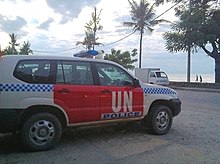United Nations Transitional Administration in East Timor
 | |
 East Timor | |
| Abbreviation | UNTAET |
|---|---|
| Predecessor | Indonesian occupation of East Timor |
| Successor | East Timor |
| Formation | 25 October 1999 |
| Type | Special political mission |
| Legal status | Completed |
| Headquarters | Dili, East Timor |
Parent organization | United Nations Security Council |
The United Nations Transitional Administration in East Timor (UNTAET, Portuguese: Administração Transitória das Nações Unidas em Timor Leste), was a United Nations mission in East Timor that aimed to solve the decades-long East Timorese crisis in the area occupied by Indonesian military. UNTAET provided an interim civil administration and a peacekeeping mission in the territory of East Timor, from its establishment on 25 October 1999,[1] until its independence on 20 May 2002, following the outcome of the East Timor Special Autonomy Referendum. The transitional administration was established by United Nations Security Council Resolution 1272 in 1999.
A rarity for United Nations peacekeeping missions, UNTAET involved the United Nations directly administering the territory of East Timor. The mission's responsibilities included providing a peacekeeping force to maintain security and order; facilitating and co-ordinating relief assistance to the East Timorese; facilitating emergency rehabilitation of physical infrastructure; administering East Timor and creating structures for sustainable governance and the rule of law; and assisting in the drafting of a new constitution and conducting elections.[1]
UNTAET was established on 25 October 1999, the mission was led by Sérgio Vieira de Mello of Brazil (Special Representative of the Secretary-General for East Timor). The International Force East Timor (INTERFET) transitioned to the UNTAET Peacekeeping Force (PKF) in February 2000 and was commanded by Filipino military officer Lieutenant General Jaime de los Santos (Force Commander UNTAET).[2][3] UNTAET was abolished on 20 May 2002, with most functions passed to the East Timor government. The military and police forces were transferred to the newly created United Nations Mission of Support to East Timor (UNMISET).


UNTAET was wound up upon East Timorese independence but a United Nations presence in East Timor would continue through a newly established United Nations Mission of Support in East Timor (UNMISET).
Contributing nations
[edit]A coalition of nations sent troops to support the peace keeping mission. The forces were led by Australia, which provided the largest contingent and the out of theatre base for operations, supported by Portugal who sent the second largest contingent [4] securing the key central areas of the country,[5] followed by New Zealand, who took responsibility for the southern West sector with supporting troops from Ireland, Fiji, Nepal, and Singapore. France also sent special forces who joined the ANZACs on the first day, as well as contingents from Brazil, Canada, Denmark, Italy, Kenya, Japan, Malaysia, Singapore, South Korea, Thailand, the Philippines, Sweden, and the United Kingdom. While the United States supported the transition authority, it did so mainly by underwriting contracts to replace destroyed infrastructure and thus avoided a direct military involvement, allowing the ANZAC led force to take the lead. The United States did, however, deploy a contingent of American police officers to serve with the International Police.
See also
[edit]- United Nations Administered East Timor
- International Force for East Timor
- Timeline of UN peacekeeping missions
- UN protectorate
- United Nations Interim Administration Mission in Kosovo, a similar arrangement for Kosovo
- UNTAET Crime Scene Detachment
- United Nations Mission in East Timor
- United Nations Mission of Support to East Timor
- United Nations Integrated Mission in East Timor
References
[edit]- ^ a b United Nations Security Council Resolution 1272. S/RES/1272(1999) (1999) Retrieved 12 April 2008.
- ^ "US Dollar New Official Currency of East Timor, Central Payments Office Established". United Nations Peacekeeping (Press release). United Nations Transitional Administration in East Timor. 24 January 2000. Retrieved 22 April 2022.
- ^ "UN Soldiers Now Safeguard East Timor" (PDF). Tais Timor. Vol. 1, no. 1. UNTAET Office of Communication and Public Information. 14 February 2000. p. 1. OCLC 49547887.
- ^ Braz, Carlos Morgado. "A participação militar portuguesa em Timor-Leste e o impacto nas dinâmicas informais da reconstrução da paz" (PDF). In Freire, Maria Raquel (ed.). Consolidação da paz e a sua sustentabilidade: as missões da ONU em Timor-Leste e a contribuição de Portugal (in Portuguese). Coimbra: Imprensa da Universidade de Coimbra. pp. 155–180. doi:10.14195/978-989-26-0890-7_6. hdl:10316.2/36622. ISBN 978-989-26-0890-7.
- ^ UNTAET (28 February 2002). "UNTAET Fact Sheet 18: Peacekeeping Force". ReliefWeb. Retrieved 25 May 2022.
Further reading
[edit]- Goldstone, Anthony (2004). "UNTAET with Hindsight: The Peculiarities of Politics in an Incomplete State". Global Governance. 10: 83–98. doi:10.1163/19426720-01001008.
- Gunn, Geoffrey C. and Reyko Huang (2004; 2006), New Nation: United Nations Peacebuilding in East Timor (Faculty of Economics, Nagasaki University, Southeast Asia Monograph Series No.36. (reprint, author, Tipografia Macau Hung Heng Ltd., Macau) ISBN 99937-706-1-2
- Martin, Ian; Alexander Mayer-Rieckh (Spring 2005). "The United Nations and East Timor: From Self-Determination to State-Building". International Peacekeeping. 12 (1): 125–145. doi:10.1080/1353331042000286595. S2CID 143653698.
- Pemper, Tammy (2019). Scorched Earth: Peacekeeping in Timor during a campaign of death and destruction. Big Sky Publishing. A biography from a peacekeeper's perspective, based on actual events in the days leading up to UNTAET.
External links
[edit]- Archived official website
- The United Nations and East Timor – A Chronology
- UNTAET Mission Summary
- A Brief History of Australian Army Operations in East Timor, 1999–2005
- Archived web-site of first Transitional Administration
- Archived web-site of second Transitional Administration


 French
French Deutsch
Deutsch
